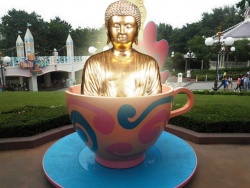Difference between revisions of "Self-existing Perfection"
Jump to navigation
Jump to search
| Line 1: | Line 1: | ||
{{DisplayImages|3752}} | {{DisplayImages|3752}} | ||
| − | [[Self-existing Perfection]] ([[Tibetan]]: {{BigTibetan|[[རྫོགས་པ་རང་བྱུང]]}}, [[Wylie]]: [[rdzogs pa rang byung]]) is one of the [[Seventeen tantras]] of [[Dzogchen]] [[Upadesha]]. | + | [[Self-existing Perfection]] ([[Tibetan]]: {{BigTibetan|[[རྫོགས་པ་རང་བྱུང]]}}, Tib. [[dzogpa rangjung]] [[Wylie]]: [[rdzogs pa rang byung]]) is one of the [[Seventeen tantras]] of [[Dzogchen]] [[Upadesha]]. |
[[Erik Pema Kunsang|Kunsang]] (1987, 2007: p.90) provides the following summary of this [[Dzogchen]] [[tantra]] and foregrounds the premier motif of the [[four empowerments]]: | [[Erik Pema Kunsang|Kunsang]] (1987, 2007: p.90) provides the following summary of this [[Dzogchen]] [[tantra]] and foregrounds the premier motif of the [[four empowerments]]: | ||
Revision as of 12:11, 27 April 2014
Self-existing Perfection (Tibetan: རྫོགས་པ་རང་བྱུང, Tib. dzogpa rangjung Wylie: rdzogs pa rang byung) is one of the Seventeen tantras of Dzogchen Upadesha.
Kunsang (1987, 2007: p.90) provides the following summary of this Dzogchen tantra and foregrounds the premier motif of the four empowerments:
- "...[it] teaches how to prepare to be a suitable recipient of the teachings by means of the four empowerments."
